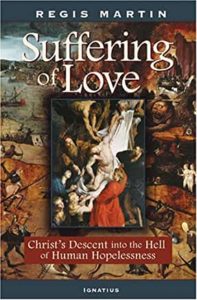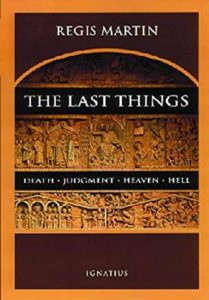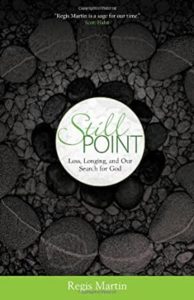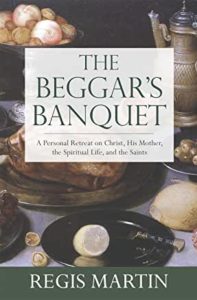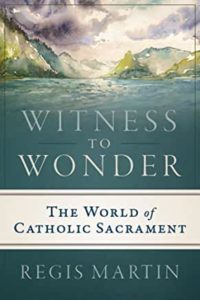Month: February 2022
IP#357 Gretchen Crowe – Praying the Rosary with St. John Paul II on Inside the Pages with Kris McGregor podcast
Podcast: Play in new window | Download (Duration: 28:17 — 19.5MB) | Embed
Subscribe: Apple Podcasts | Spotify | Amazon Music | Android | Pandora | iHeartRadio | JioSaavn | Podchaser | Gaana | Podcast Index | Email | TuneIn | Deezer | Anghami | RSS | More

What a delight to have a conversation with Gretchen Crowe about two of my favorite topics – the Holy Rosary of Our Lady and St. Pope John Paul II! Gretchen has authored a beautiful book entitled “Praying the Rosary with St. John Paul II” which is filled with reflections and images which illuminate the mysteries of this treasured prayer through the gaze of this beloved saint. We highly recommend this book!
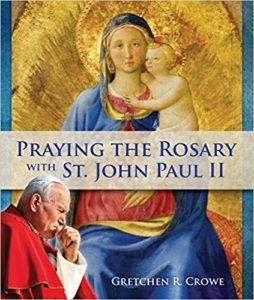 You can find the book here
You can find the book here
From the book description:
With this book, you can pray the Rosary with the saint who loved it so much. For each mystery of the Rosary, you will find:
- The spiritual fruit that accompanies each mystery
- A short reflection on how Pope St. John Paul II embodied the spiritual fruit
- A Scripture passage for reflection
- An excerpt from a talk or writing of John Paul II
Whether the Rosary is already your favorite prayer or you’re just learning to pray it, Praying the Rosary with St. John Paul II will help you “rediscover the Rosary in the light of Scripture, in harmony with the Liturgy, and in the context of your daily lives.”
ST-Luke Ep 15- The Gospel of Luke – Chapter 7 Part 1 – Seeking Truth with Sharon Doran – Discerning Hearts Podcast
Podcast: Play in new window | Download (Duration: 30:41 — 21.3MB) | Embed
Subscribe: Apple Podcasts | Spotify | Amazon Music | Android | Pandora | iHeartRadio | JioSaavn | Podchaser | Gaana | Podcast Index | Email | TuneIn | Deezer | Anghami | RSS | More
Episode 15 – The Gospel of Luke – Chapter 7 Part 1
“Resurrection at Nain”
In Luke 7, we read that John the Baptist sent word to Jesus, asking if Jesus was the one “who is to come”. We know from Matthew 14 that John was imprisoned for chastising Herod about his unlawful marriage to Herodias. In his desolation, John wanted to know if Jesus was indeed the Messiah. Having just performed many miracles, Jesus responded by saying “the blind receive their sight, the lame walk, the lepers are cleansed, the deaf hear, the dead are raised, the poor have good news brought to them” thus fulfilling the Messianic prophecies of Isaiah 35. Going further, Jesus told the crowd that John was not a “reed shaken by the wind.” That is, John was a man of serious conviction, the messenger sent to prepare the way for Messiah, fulfilling the prophecies of Malachi 3 and Isaiah 40. Jesus also said that “among those born of women no one is greater than John, yet the least in the kingdom of God is greater than he.” Who is the “least in the kingdom of God”? We read in Philippians 2 that Jesus “humbled himself and became obedient to the point of death—even death on a cross.” Jesus, the most humble in the kingdom of heaven, was baptized by John, the greatest born of women.
Going further, we then look at the somewhat mysterious verses about the analogy of children in the marketplace, who played a dirge yet no one wept and played the flute, yet no one danced. This passage alludes to two major life events: weddings and funerals. John played the “funeral dirge” of repentance, while Jesus played the “wedding march” of salvation. Yet the Pharisees refused to listen to either.
Returning to the beginning of Luke 7, we read of the healing of the Centurion’s servant. We repeat the powerful words of the Centurion just before receiving communion: “Lord, I am not worthy that you should enter under my roof, but only say the word and my soul shall be healed.” The Centurion understood the nature of authority, and willingly submitted to the healing power of Jesus’ Word. Reading about the Centurion reminds us that Israel was under Roman rule at the time of Jesus. Prior to his assassination in 44 BC, Julius Caesar appointed his nephew and adopted son, Octavius, to succeed him at his death. At the time of Julius’ death, a great comet appeared and was seen as a sign in favor of the deification of Julius, who was ultimately declared a god. Augustus reigned for 40 years, ruling at the time of Jesus’ birth as described in Luke 2. After expanding his empire, Augustus was able to maintain a period of political stability known as Pax Romana. Thus Augustus was not only titled the “son of god” but also the “prince of peace” at the time of Jesus’ birth and childhood. At the time of Jesus’ adult ministry, Tiberius Caesar was the Roman emperor and Herod the Edomite was the puppet king of Israel who collaborated with the occupying Romans. The Roman army was made up of legions of 6000 soldiers and a centurion was a veteran soldier in command of over 100 men. Commensurate with their position, centurions were paid well which explains why the centurion mentioned in Luke 7 would have the resources to build the synagogue at Capernaum.
The story of Jesus raising the son of the widow of Nain is found only in Luke. This recalls the resurrection stories of Elijah, who raised the son of the widow of Zarephath (1 Kings 17), and Elisha, who with a double portion of Elijah’s spirit, performed double the Old Testament resurrection miracles. Elisha raised the son of the Shunammite woman (2 Kings 4). Also, a dead man was brought back to life when his body touched the bones of Elisha (2 Kings 13). The city of Nain was in close proximity to Nazareth, the hometown of Mary and Jesus. We can imagine that at Jesus’ crucifixion, Mary may have recalled the raising of the widow of Nain’s son, giving her hope for the resurrection of her own son.
The lecture draws to a close with the story of the sinful woman who anointed Jesus as he dined at the house of Simon, the Pharisee. Jesus was able to read the harsh heart of Simon and teach him a valuable lesson: he who is forgiven much loves much. Redeemed sinners have the grace to love lavishly.
©2019 Seeking Truth Catholic Bible Study
Sharon Doran serves as the teaching director of “Seeking Truth.” An experienced Bible Study teacher, Sharon has a passion for scripture that will motivate and challenge you to immerse yourself in God’s Word and apply His message to your everyday life.
For more in this series, visit the Seeking Truth with Sharon Doran Discerning Hearts page.
 “Seeking Truth” is an in-depth Catholic Bible Study commissioned by the Archdiocese of Omaha in response to John Paul II’s call to the New Evangelization as well as Pope Benedict XVI’s exhortation for all Catholics to study scripture. To learn more, go to www.seekingtruth.net
“Seeking Truth” is an in-depth Catholic Bible Study commissioned by the Archdiocese of Omaha in response to John Paul II’s call to the New Evangelization as well as Pope Benedict XVI’s exhortation for all Catholics to study scripture. To learn more, go to www.seekingtruth.net
SP 30 – Episode 30 – From Grim and Grumpy Souls, Good Lord Deliver Us – In Search of the Still Point with Dr. Regis Martin – Discerning Hearts Podcast
Podcast: Play in new window | Download (Duration: 7:12 — 10.0MB) | Embed
Subscribe: Apple Podcasts | Spotify | Amazon Music | Android | Pandora | iHeartRadio | JioSaavn | Podchaser | Gaana | Podcast Index | Email | TuneIn | Deezer | Anghami | RSS | More
Episode 30 – From Grim and Grumpy Souls, Good Lord Deliver Us
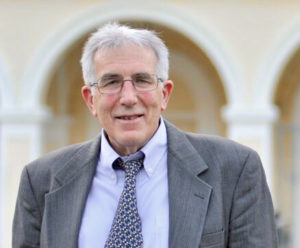
Discerning Hearts is honored to host the reflections of Dr. Regis Martin. Filled with profound insights, wisdom, and joy, he is one of the most trustworthy guides one can have on the spiritual journey.
For years Regis Martin, STD, has been regaling audiences about the mysteries of God and Church, most especially his students at Franciscan University of Steubenville where he teaches theology. Author of half-dozen or more books, including The Suffering of Love (Ignatius, 2006), The Last Things (Ignatius Press, 2011), Still Point (Ave Maria, 2012), The Beggar’s Banquet (Emmaus Road, 2012), Witness to Wonder (Emmaus Road, 2017) his work frequently appears in Crises and The Catholic Thing.
Chapter 30: The Impossible Made Possible – How to Pray with David Torkington – Discerning Hearts Podcast
Podcast: Play in new window | Download (Duration: 4:20 — 6.1MB) | Embed
Subscribe: Apple Podcasts | Spotify | Amazon Music | Android | Pandora | iHeartRadio | JioSaavn | Podchaser | Gaana | Podcast Index | Email | TuneIn | Deezer | Anghami | RSS | More
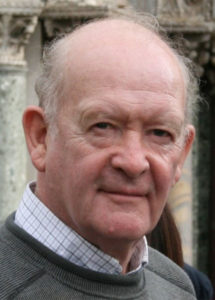
Episode 30 – The Impossible Made Possible
“With love you may bring your heart to do whatsoever you may please. The hardest things become easy and pleasant, but without love you will find anything not only difficult but also impossible.” – John of Bonilla, OFM
We can achieve nothing in the spiritual life without creating quality space and time in our daily lives, for the prayer that gives us access to the same love that filled Jesus Christ and inspired everything he said and did.
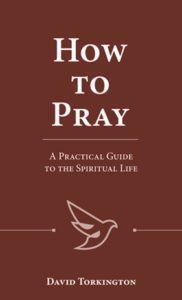 You can find the book here.
You can find the book here.
This little book How to Pray – A Practical Guide to the Spiritual life by David Torkington, was published by Our Sunday Visitor. It was written for those prepared to restructure their daily lives to make time for the prayer where they can be transformed by the love that only God can give.
In the foreword to this new book from OSV, “How to Pray: A Practical Guide to the Spiritual Life,” Sister Wendy Beckett wrote,
“There are no hideaways here, no excuses, but no alarming demands, either. Instead, Torkington seeks only to show us the truth, that truth that sets us free and convinces us that the yoke of Jesus is easy and his burden light. All we need is to understand and to choose. This book offers us the help we need to understand, and then the choice is ours.”
This is not your standard “prayer book” – it is not a compilation of Catholic prayers for you to just read. Rather, this is a series of 40 reflections on prayer intended to open you up to the transformation that is possible through prayer, through the love that God can give us through prayer.
Endorsement
“From here to eternity! For those drawn to contemplative prayer, David Torkington offers compelling clarity and common sense. Gentle kindness guides his practical counsel, and he is careful to help us see the solid principles in which he roots his insights. An authentic and reliable guard against counterfeits, his wisdom points to the heights and grounded-ness of the Catholic mystical tradition at a time when it is most needed.”
Dr. Anthony Lilles, STD: Associate Professor and Academic Dean of St John’s Seminary in Camarillo, as well as the academic advisor for Juan Diego House of Priestly Formation for the diocese of Los Angeles. For over twenty years, he served the Church in Northern Colorado, where he joined and eventually served as dean of the founding faculty of Saint John Vianney Theological Seminary in Denver.
Visit his website: www.davidtorkington.com.
The author of the popular Peter Calvay series, his books include Wisdom from the Western Isles, Wisdom from Franciscan Italy, Wisdom from the Christian Mystics, Prayer Made Simple (CTS), and How to Pray by Our Sunday Visitor. His books have been translated into 13 different languages.
IP#485 Fr. Cassian Koenemann – The Grace of Nothingness on Inside the Pages with Kris McGregor podcast
Podcast: Play in new window | Download (Duration: 41:19 — 28.5MB) | Embed
Subscribe: Apple Podcasts | Spotify | Amazon Music | Android | Pandora | iHeartRadio | JioSaavn | Podchaser | Gaana | Podcast Index | Email | TuneIn | Deezer | Anghami | RSS | More
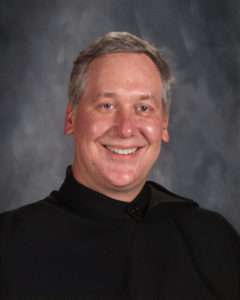 What a delight to discuss with Fr. Cassian Koenemann O.S.B. The Grace of “Nothingness” – Navigating the Spiritual Life with Blessed Columba Marmion. Many today are unaware of the teachings of this great 20th-century spiritual master, but his influence can be seen in the lives of today’s beloved saints, including St. Teresa of Calcutta. Thanks to Fr. Cassian, we can all better benefit from Bl. Columba’s great spiritual legacy. We HIGHLY recommend this book for the spiritual library. Don’t miss the opportunity to grow in “nothingness”, your life will be richer for it.
What a delight to discuss with Fr. Cassian Koenemann O.S.B. The Grace of “Nothingness” – Navigating the Spiritual Life with Blessed Columba Marmion. Many today are unaware of the teachings of this great 20th-century spiritual master, but his influence can be seen in the lives of today’s beloved saints, including St. Teresa of Calcutta. Thanks to Fr. Cassian, we can all better benefit from Bl. Columba’s great spiritual legacy. We HIGHLY recommend this book for the spiritual library. Don’t miss the opportunity to grow in “nothingness”, your life will be richer for it.
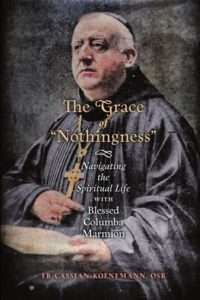 To obtain a copy of the book visit here
To obtain a copy of the book visit here
“The Grace of ‘Nothingness’ is a work of deep and sober reflection. What it reveals to us of Columba Marmion’s vision, however, is as fresh and surprising as the Gospel itself. Here we find, in the understanding of ‘nothingness,’ not the least hint of anything mandarin or esoteric, but a theme that focuses attention on the unique, saving grace of Christ. Fr Cassian complements his study with a helpful overview of the centuries of reflection on the theme of ‘nothingness’ in the writings of Catholic saints and mystics. This work is without question a truly insightful contribution to spiritual theology.”
—FR. PAUL MURRAY, OP
author of A Journey with Jonah
“St John of the Cross says that at the summit of the spiritual life there is ‘nothing.’ This introduction to the theme of ‘nothingness’ in the writings of Abbot Marmion offers fresh insights into this demanding feature of Christian life.”
—FR. CHRISTOPHER JAMISON, OSB
Abbot President of the English Benedictine Congregation
Tuesday of the Seventh Week in Ordinary Time – A Time of Lectio Divina for the Discerning Heart Podcast
Podcast: Play in new window | Download (Duration: 9:47 — 6.9MB) | Embed
Subscribe: Apple Podcasts | Spotify | Amazon Music | Android | Pandora | iHeartRadio | JioSaavn | Podchaser | Gaana | Podcast Index | Email | TuneIn | Deezer | Anghami | RSS | More
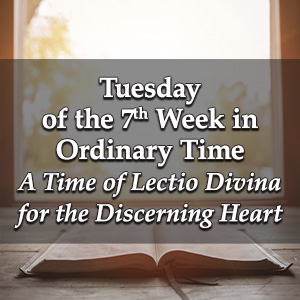 Tuesday of the Seventh Week in Ordinary Time – A Time of Lectio Divina for the Discerning Heart Podcast
Tuesday of the Seventh Week in Ordinary Time – A Time of Lectio Divina for the Discerning Heart Podcast
As you begin, take a deep breath and exhale slowly. For at least the next few moments, surrender all the cares and concerns of this day to the Lord.
Say slowly from your heart “Jesus, I Trust In You…You Take Over”
Become aware that He is with you, looking upon you with love, wanting to be heard deep within in your heart…
From the Holy Gospel of Matthew 16:13-19
When Jesus came to the region of Caesarea Philippi he put this question to his disciples, ‘Who do people say the Son of Man is?’ And they said, ‘Some say he is John the Baptist, some Elijah, and others Jeremiah or one of the prophets.’ ‘But you,’ he said ‘who do you say I am?’ Then Simon Peter spoke up, ‘You are the Christ,’ he said ‘the Son of the living God.’ Jesus replied, ‘Simon son of Jonah, you are a happy man! Because it was not flesh and blood that revealed this to you but my Father in heaven. So I now say to you: You are Peter and on this rock I will build my Church. And the gates of the underworld can never hold out against it. I will give you the keys of the kingdom of heaven: whatever you bind on earth shall be considered bound in heaven; whatever you loose on earth shall be considered loosed in heaven.’
What word made this passage come alive for you?
What did you sense the Lord saying to you?
Once more give the Lord an opportunity to speak to you:
When Jesus came to the region of Caesarea Philippi he put this question to his disciples, ‘Who do people say the Son of Man is?’ And they said, ‘Some say he is John the Baptist, some Elijah, and others Jeremiah or one of the prophets.’ ‘But you,’ he said ‘who do you say I am?’ Then Simon Peter spoke up, ‘You are the Christ,’ he said ‘the Son of the living God.’ Jesus replied, ‘Simon son of Jonah, you are a happy man! Because it was not flesh and blood that revealed this to you but my Father in heaven. So I now say to you: You are Peter and on this rock I will build my Church. And the gates of the underworld can never hold out against it. I will give you the keys of the kingdom of heaven: whatever you bind on earth shall be considered bound in heaven; whatever you loose on earth shall be considered loosed in heaven.’
What did your heart feel as you listened?
What did you sense the Lord saying to you?
Once more, through Him, with Him and in Him listen to the Word:
When Jesus came to the region of Caesarea Philippi he put this question to his disciples, ‘Who do people say the Son of Man is?’ And they said, ‘Some say he is John the Baptist, some Elijah, and others Jeremiah or one of the prophets.’ ‘But you,’ he said ‘who do you say I am?’ Then Simon Peter spoke up, ‘You are the Christ,’ he said ‘the Son of the living God.’ Jesus replied, ‘Simon son of Jonah, you are a happy man! Because it was not flesh and blood that revealed this to you but my Father in heaven. So I now say to you: You are Peter and on this rock I will build my Church. And the gates of the underworld can never hold out against it. I will give you the keys of the kingdom of heaven: whatever you bind on earth shall be considered bound in heaven; whatever you loose on earth shall be considered loosed in heaven.’
What touched your heart in this time of prayer?
What did your heart feel as you prayed?
What do you hope to carry with you from this time with the Lord?
Our Father, who art in heaven,
hallowed be thy name.
Thy kingdom come.
Thy will be done on earth, as it is in heaven.
Give us this day our daily bread,
and forgive us our trespasses,
as we forgive those who trespass against us,
and lead us not into temptation,
but deliver us from evil.
Amen
Excerpt from THE JERUSALEM BIBLE, copyright (c) 1966 by Darton, Longman & Todd, Ltd. and Doubleday, a division of Penguin Random House, Inc. Reprinted by Permission.
WM25 – Vatican II – Gaudium et Spes part 2 – Why it Matters: An Exploration of Faith with Archbishop George Lucas Podcast
Podcast: Play in new window | Download (Duration: 27:54 — 19.3MB) | Embed
Subscribe: Apple Podcasts | Spotify | Amazon Music | Android | Pandora | iHeartRadio | JioSaavn | Podchaser | Gaana | Podcast Index | Email | TuneIn | Deezer | Anghami | RSS | More

Episode 25 Vatican II – Gaudium et Spes pt. 2 – Why it Matters: An Exploration of Faith with Archbishop George Lucas
In this episode with Archbishop Lucas, we continue our conversation on the Pastoral Constitution on the Church in the Modern World
Gaudium et spes (Ecclesiastical Latin: [ˈɡau̯di.um et ˈspes], “Joy and Hope”), the Pastoral Constitution on the Church in the Modern World, is one of the four constitutions resulting from the Second Vatican Council in 1965. It was the last and longest published document from the council and is the first constitution published by an ecumenical council to address the entire world.
Approved by a vote of 2,307 to 75 of the bishops assembled at the council, it was promulgated by Pope Paul VI on 7 December 1965, the day the council ended.
An excerpt from Gaudium et Spes:
22. The truth is that only in the mystery of the incarnate Word does the mystery of man take on light. For Adam, the first man, was a figure of Him Who was to come,(20) namely Christ the Lord. Christ, the final Adam, by the revelation of the mystery of the Father and His love, fully reveals man to man himself and makes his supreme calling clear. It is not surprising, then, that in Him all the aforementioned truths find their root and attain their crown.
He Who is “the image of the invisible God” (Col. 1:15),(21) is Himself the perfect man. To the sons of Adam He restores the divine likeness which had been disfigured from the first sin onward. Since human nature as He assumed it was not annulled,(22) by that very fact it has been raised up to a divine dignity in our respect too. For by His incarnation the Son of God has united Himself in some fashion with every man. He worked with human hands, He thought with a human mind, acted by human choice(23) and loved with a human heart. Born of the Virgin Mary, He has truly been made one of us, like us in all things except sin.(24)
As an innocent lamb He merited for us life by the free shedding of His own blood. In Him God reconciled us(25) to Himself and among ourselves; from bondage to the devil and sin He delivered us, so that each one of us can say with the Apostle: The Son of God “loved me and gave Himself up for me” (Gal. 2:20). By suffering for us He not only provided us with an example for our imitation,(26) He blazed a trail, and if we follow it, life and death are made holy and take on a new meaning.
The Christian man, conformed to the likeness of that Son Who is the firstborn of many brothers,(27) received “the first-fruits of the Spirit” (Rom. 8:23) by which he becomes capable of discharging the new law of love.(28) Through this Spirit, who is “the pledge of our inheritance” (Eph. 1:14), the whole man is renewed from within, even to the achievement of “the redemption of the body” (Rom. 8:23): “If the Spirit of him who raised Jesus from the death dwells in you, then he who raised Jesus Christ from the dead will also bring to life your mortal bodies because of his Spirit who dwells in you” (Rom. 8:11).(29) Pressing upon the Christian to be sure, are the need and the duty to battle against evil through manifold tribulations and even to suffer death. But, linked with the paschal mystery and patterned on the dying Christ, he will hasten forward to resurrection in the strength which comes from hope.(30)
All this holds true not only for Christians, but for all men of good will in whose hearts grace works in an unseen way.(31) For, since Christ died for all men,(32) and since the ultimate vocation of man is in fact one, and divine, we ought to believe that the Holy Spirit in a manner known only to God offers to every man the possibility of being associated with this paschal mystery.
Such is the mystery of man, and it is a great one, as seen by believers in the light of Christian revelation. Through Christ and in Christ, the riddles of sorrow and death grow meaningful. Apart from His Gospel, they overwhelm us. Christ has risen, destroying death by His death; He has lavished life upon us(33) so that, as sons in the Son, we can cry out in the Spirit; Abba, Father(34).
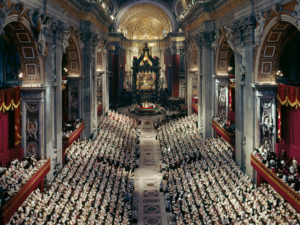
For the documents of Vatican II visit here
For more episodes in this series visit the
Why it Matters: An Exploration of Faith with Archbishop George Lucas Podcast page
For more teachings and information about Archbishop George J. Lucas of the Archdiocese of Omaha, visit: archomaha.org
Monday of the Seventh Week in Ordinary Time – A Time of Lectio Divina for the Discerning Heart Podcast
Podcast: Play in new window | Download (Duration: 13:59 — 9.8MB) | Embed
Subscribe: Apple Podcasts | Spotify | Amazon Music | Android | Pandora | iHeartRadio | JioSaavn | Podchaser | Gaana | Podcast Index | Email | TuneIn | Deezer | Anghami | RSS | More
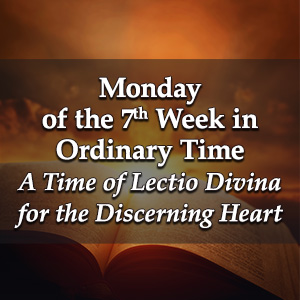 Monday of the Seventh Week in Ordinary Time – A Time of Lectio Divina for the Discerning Heart Podcast
Monday of the Seventh Week in Ordinary Time – A Time of Lectio Divina for the Discerning Heart Podcast
As you begin, take a deep breath and exhale slowly. For at least the next few moments, surrender all the cares and concerns of this day to the Lord.
Say slowly from your heart “Jesus, I Trust In You…You Take Over”
Become aware that He is with you, looking upon you with love, wanting to be heard deep within in your heart…
From the Holy Gospel of Mark 9:14-29
When Jesus, with Peter, James and John came down from the mountain and rejoined the disciples, they saw a large crowd round them and some scribes arguing with them. The moment they saw him the whole crowd were struck with amazement and ran to greet him. ‘What are you arguing about with them?’ he asked. A man answered him from the crowd, ‘Master, I have brought my son to you; there is a spirit of dumbness in him, and when it takes hold of him it throws him to the ground, and he foams at the mouth and grinds his teeth and goes rigid. And I asked your disciples to cast it out and they were unable to.’ ‘You faithless generation’ he said to them in reply. ‘How much longer must I be with you? How much longer must I put up with you? Bring him to me.’ They brought the boy to him, and as soon as the spirit saw Jesus it threw the boy into convulsions, and he fell to the ground and lay writhing there, foaming at the mouth. Jesus asked the father, ‘How long has this been happening to him?’ ‘From childhood,’ he replied ‘and it has often thrown him into the fire and into the water, in order to destroy him. But if you can do anything, have pity on us and help us.’ ‘If you can?’ retorted Jesus. ‘Everything is possible for anyone who has faith.’ Immediately the father of the boy cried out, ‘I do have faith. Help the little faith I have!’ And when Jesus saw how many people were pressing round him, he rebuked the unclean spirit. ‘Deaf and dumb spirit,’ he said ‘I command you: come out of him and never enter him again.’ Then throwing the boy into violent convulsions it came out shouting, and the boy lay there so like a corpse that most of them said, ‘He is dead.’ But Jesus took him by the hand and helped him up, and he was able to stand. When he had gone indoors his disciples asked him privately, ‘Why were we unable to cast it out?’ ‘This is the kind’ he answered ‘that can only be driven out by prayer.’
What word made this passage come alive for you?
What did you sense the Lord saying to you?
Once more give the Lord an opportunity to speak to you:
When Jesus, with Peter, James and John came down from the mountain and rejoined the disciples, they saw a large crowd round them and some scribes arguing with them. The moment they saw him the whole crowd were struck with amazement and ran to greet him. ‘What are you arguing about with them?’ he asked. A man answered him from the crowd, ‘Master, I have brought my son to you; there is a spirit of dumbness in him, and when it takes hold of him it throws him to the ground, and he foams at the mouth and grinds his teeth and goes rigid. And I asked your disciples to cast it out and they were unable to.’ ‘You faithless generation’ he said to them in reply. ‘How much longer must I be with you? How much longer must I put up with you? Bring him to me.’ They brought the boy to him, and as soon as the spirit saw Jesus it threw the boy into convulsions, and he fell to the ground and lay writhing there, foaming at the mouth. Jesus asked the father, ‘How long has this been happening to him?’ ‘From childhood,’ he replied ‘and it has often thrown him into the fire and into the water, in order to destroy him. But if you can do anything, have pity on us and help us.’ ‘If you can?’ retorted Jesus. ‘Everything is possible for anyone who has faith.’ Immediately the father of the boy cried out, ‘I do have faith. Help the little faith I have!’ And when Jesus saw how many people were pressing round him, he rebuked the unclean spirit. ‘Deaf and dumb spirit,’ he said ‘I command you: come out of him and never enter him again.’ Then throwing the boy into violent convulsions it came out shouting, and the boy lay there so like a corpse that most of them said, ‘He is dead.’ But Jesus took him by the hand and helped him up, and he was able to stand. When he had gone indoors his disciples asked him privately, ‘Why were we unable to cast it out?’ ‘This is the kind’ he answered ‘that can only be driven out by prayer.’
What did your heart feel as you listened?
What did you sense the Lord saying to you?
Once more, through Him, with Him and in Him listen to the Word:
When Jesus, with Peter, James and John came down from the mountain and rejoined the disciples, they saw a large crowd round them and some scribes arguing with them. The moment they saw him the whole crowd were struck with amazement and ran to greet him. ‘What are you arguing about with them?’ he asked. A man answered him from the crowd, ‘Master, I have brought my son to you; there is a spirit of dumbness in him, and when it takes hold of him it throws him to the ground, and he foams at the mouth and grinds his teeth and goes rigid. And I asked your disciples to cast it out and they were unable to.’ ‘You faithless generation’ he said to them in reply. ‘How much longer must I be with you? How much longer must I put up with you? Bring him to me.’ They brought the boy to him, and as soon as the spirit saw Jesus it threw the boy into convulsions, and he fell to the ground and lay writhing there, foaming at the mouth. Jesus asked the father, ‘How long has this been happening to him?’ ‘From childhood,’ he replied ‘and it has often thrown him into the fire and into the water, in order to destroy him. But if you can do anything, have pity on us and help us.’ ‘If you can?’ retorted Jesus. ‘Everything is possible for anyone who has faith.’ Immediately the father of the boy cried out, ‘I do have faith. Help the little faith I have!’ And when Jesus saw how many people were pressing round him, he rebuked the unclean spirit. ‘Deaf and dumb spirit,’ he said ‘I command you: come out of him and never enter him again.’ Then throwing the boy into violent convulsions it came out shouting, and the boy lay there so like a corpse that most of them said, ‘He is dead.’ But Jesus took him by the hand and helped him up, and he was able to stand. When he had gone indoors his disciples asked him privately, ‘Why were we unable to cast it out?’ ‘This is the kind’ he answered ‘that can only be driven out by prayer.’
What touched your heart in this time of prayer?
What did your heart feel as you prayed?
What do you hope to carry with you from this time with the Lord?
Our Father, who art in heaven,
hallowed be thy name.
Thy kingdom come.
Thy will be done on earth, as it is in heaven.
Give us this day our daily bread,
and forgive us our trespasses,
as we forgive those who trespass against us,
and lead us not into temptation,
but deliver us from evil.
Amen
Excerpt from THE JERUSALEM BIBLE, copyright (c) 1966 by Darton, Longman & Todd, Ltd. and Doubleday, a division of Penguin Random House, Inc. Reprinted by Permission.
How can we possibly love as God expects? – Building a Kingdom of Love w/ Msgr. John Esseff Podcast
Podcast: Play in new window | Download (Duration: 28:18 — 19.5MB) | Embed
Subscribe: Apple Podcasts | Spotify | Amazon Music | Android | Pandora | iHeartRadio | JioSaavn | Podchaser | Gaana | Podcast Index | Email | TuneIn | Deezer | Anghami | RSS | More

“Building a Kingdom of Love” – “How can we possibly love as God expects? Only “through Him, with Him, in Him!”
Gospel MT 22:34-40
When the Pharisees heard that Jesus had silenced the Sadducees,
they gathered together, and one of them,
a scholar of the law tested him by asking,
“Teacher, which commandment in the law is the greatest?”
He said to him,
“You shall love the Lord, your God,
with all your heart,
with all your soul,
and with all your mind.
This is the greatest and the first commandment.
The second is like it:
You shall love your neighbor as yourself.
The whole law and the prophets depend on these two commandments.”
Msgr. John A. Esseff is a Roman Catholic priest in the Diocese of Scranton. Msgr. Esseff served a retreat director and confessor to St. Teresa of Calcutta. He continues to offer direction and retreats for the Sisters of the Missionaries of Charity. Msgr. Esseff encountered St. Padre Pio, who would become a spiritual father to him. He has lived in areas around the world, serving in the Pontifical missions, a Catholic organization established by Pope St. John Paul II to bring the Good News to the world especially to the poor. Msgr. Esseff assisted the founders of the Institute for Priestly Formation and continues to serve as a spiritual director for the Institute. He continues to serve as a retreat leader and director to bishops, priests and sisters and seminarians and other religious leaders around the world.

